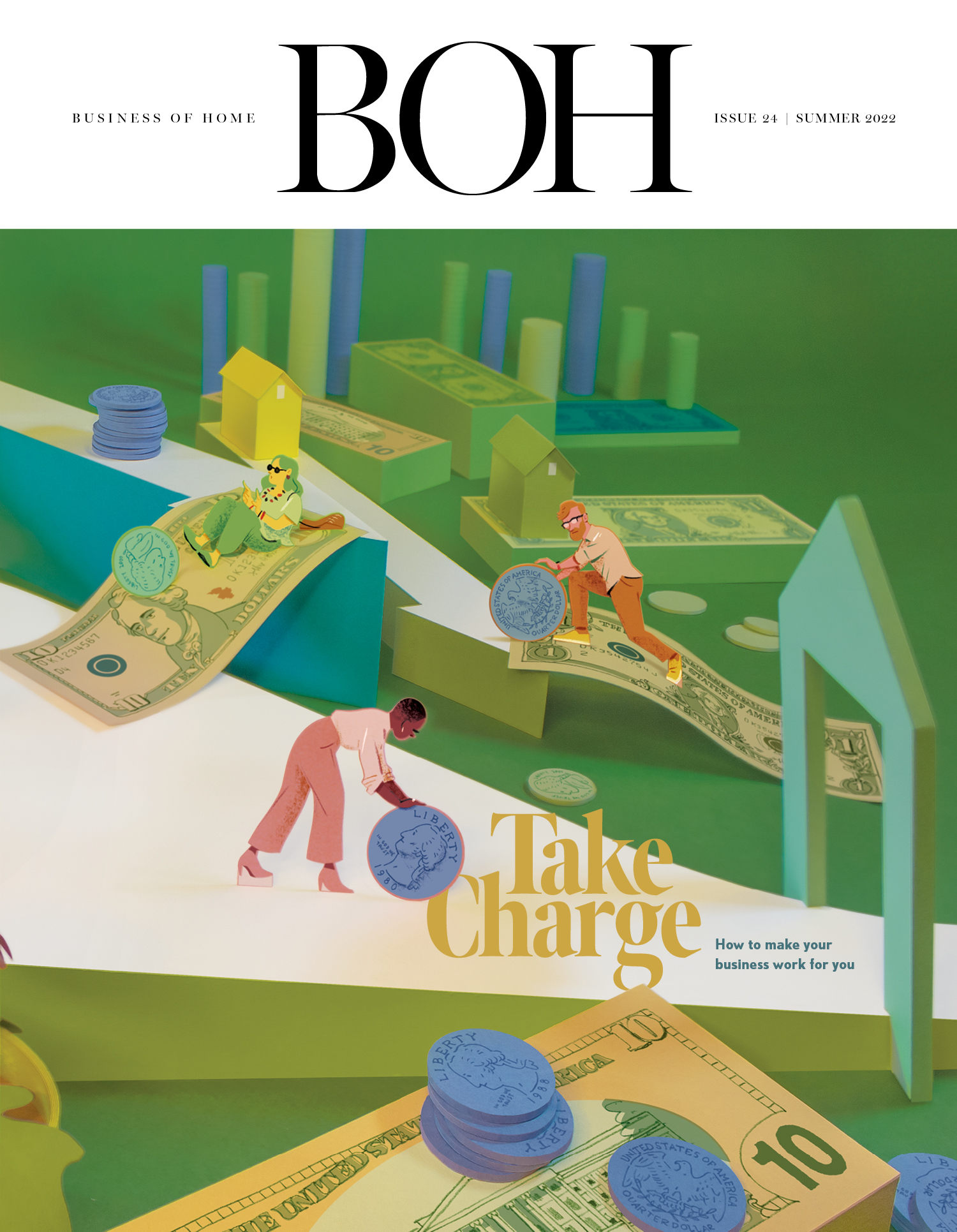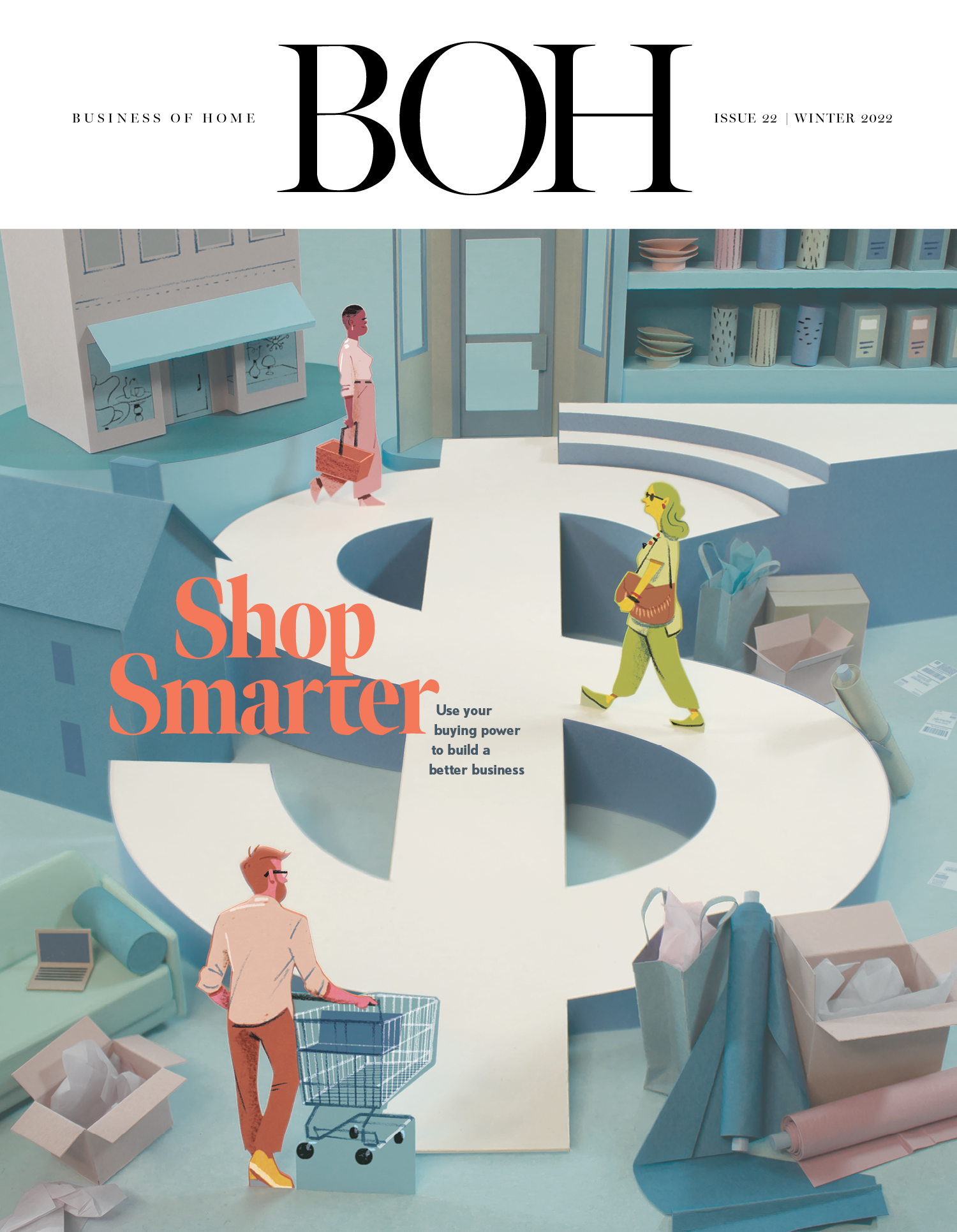In 2012, Samantha Rose had a great idea for an invention: a single-piece silicone spatula. She scoured the internet and couldn’t find any evidence that one existed—so she bought some silicone and made a prototype, working around her day job as a marketing director. After giving her gadget to friends and family as a holiday gift, she tried calling up a few factories to see if they could help her make a small batch of the product. From them, Rose heard a familiar refrain: “We can’t make 10, we can make 10,000.” She thought, “Why not?” and launched a Kickstarter with a scrappy home-made video to jump-start her new venture.
“People loved it—more than just my grandma bought one,” says Rose. “The very next question out of their mouths was ‘What’s next?’”

A decade later, that same company—now called GIR, for Get It Right—had grown to 55 different products and 500 SKUs. Beyond an expanding selection, operations were becoming increasingly complex, branching out into multiple revenue streams, app licensing, private-label product development for bigger housewares brands and fulfillment services for other companies. Rose’s ambitions had grown, too. She’d started an app-assisted coffee grinder business along the way—graduating from spatulas to small consumer electronics.
Then Pattern Brands came along. A unique player in the industry, the New York–based holding company, launched in 2019, owns six home industry brands that share resources for operations, tech and marketing. The company’s founders had gotten to know Rose several years before, during the group’s first iteration as Gin Lane—a New York brand agency for early-stage consumer goods startups. For Rose, who was looking to start a new venture, the decision to sell GIR to Pattern in June 2021 was a no-brainer.
In selling GIR to Pattern Brands, Rose joins a growing number of e-commerce and DTC founders seeking exit strategies, prompting a new breed of buyers to pop up and provide liquidity. Gathering small businesses under one large umbrella, these holding companies provide their family of brands with access to shared resources for operations, tech and marketing.
In the current retail landscape, DTC brands need all the help they can get. With inflation curbing consumer spending in recent months, smaller brands are increasingly competing for consumers’ shrinking wallets—and in an oversaturated DTC space, the competition is stiff. Plus, like consumers, companies are facing rising costs. Marketing, materials, distribution, and labor are all more expensive than ever.
“It’s been a hard time to be a small, undercapitalized business in the last two-plus years,” says Bo Stump, a partner at Stump & Company, a North Carolina–based mergers and acquisitions firm specializing in the furniture industry. “There’s a new headache every day. For some companies, you have these [industry- or product-specific] challenges, and then you add this macroeconomic outlook, and it can become really challenging for your business to grow or [even to] tread water.”

Within the past year, many DTC brands have found themselves stuck in a “negative feedback loop,” says Stump. Already facing supply chain issues and rising material costs, they begin to receive criticism from customers frustrated by longer lead times. In turn, shopping activity slows and the company’s cash reserves dwindle, making it harder to keep inventory in stock, which leads to even longer lead times, fewer sales and less revenue overall. At that point, growth becomes a distant dream—and selling the business starts to gain appeal.
Right on cue, a new class of buyer has emerged to take advantage of the growing market for DTC companies looking to sell. Pattern is joined by similar recent ventures, including Win Brands Group, Resident and Dragonfly Commerce, which all seek to snap up smaller companies in order to provide them with industry knowledge and shared resources to ultimately power growth. Stump speculates that in the world of mergers and acquisitions, previously dominated by strategic partnerships and private equity firms, this new kind of holding company might just be the next major player. “It’s a new type of investor class that’s interested in these smaller brands, that literally just didn’t exist more than a handful of years ago,” he says.
Pattern itself is a product of the rapidly changing DTC climate. In the 2010s, there were just 20,000 brands on e-commerce platform Shopify, says Pattern CEO Nick Ling. Today, there are more than 2 million. The pool of entrepreneurs has shifted from those with venture capital funding and a major team, to basically anyone with an idea.
But founders aren’t always prepared to face the part that comes later, involving long-term growth and sustainability. Operational infrastructure, financial planning, inventory management—these aren’t areas in which DTC companies typically excel, explains Polly Wong, president of San Francisco direct marketing firm Belardi Wong and an expert in the DTC space. Many such companies are skilled at building hype around their brands and leveraging online audiences, which can lead to quick wins rather than lasting success.
Meanwhile, online advertising—a key way for DTC brands to target consumers—has gotten trickier over the past year. While Apple used to share data with Facebook and Instagram to help businesses target customers, the rollout of iOS 14.5 last summer saw the tech company allow users to opt out. After that, most major digital ad channels became far less accurate in targeting certain users—which in turn made marketing and advertising more difficult for online brands reliant on those channels. By joining a holding company like Pattern—fluent in the home industry and its consumer niches—brands can unlock the next phase of growth.
“Private equity firms invest in a business because the numbers look good,” says Wong. “They aren’t experts in any one category, usually. But the whole premise of these holding companies is that they bring specific expertise to the table—that’s the difference.”
The bright side is that even more recently, exit strategy options have also become democratized: Rather than having to hit the prohibitively high revenue bar of $500 million in order to interest a private equity firm, small-but-solid brands with loyal audiences can consider making a deal with a holding company like Pattern, which tends to look at companies that have cleared $4 to $5 million in revenue.
After all, as Stump notes, most DTC founders today are still early in their careers and often departing their companies to chase another venture or simply try something new. Ling founded Pattern to provide them an option. “We like being the next natural hope to those brands and giving mom-and-pop founders the exit they deserve while being able to grow their brands multichannel over a longer period,” he says.
Other companies are casting a much wider net. Launched in March 2021, OpenStore was created by the same founders as Opendoor—a company that helps consumers sell their homes with the click of a button. Aside from homes, businesses are among the largest assets owned by individuals, explains co-founder and head of product Matt Lanter, making OpenStore a natural extension of the same idea. The company’s goal is to go after “the long tail of entrepreneurs” on Shopify who are seeking an exit strategy, including those making as little as $500,000 in annual revenue. Unlike Pattern, which seeks to curate a group of focused brands, OpenStore is agnostic to category, scooping up everything from home goods purveyors to those selling T-shirts and frozen food.
OpenStore makes the process as streamlined as possible: A shop owner can visit the company’s website, input information about their store, including profit and loss margins, and receive an offer within the day. If the owner chooses to accept, they can close the deal within two weeks, receive 80 percent of the payment within another two weeks and collect the remaining 20 percent after a few months. Once a company is acquired, it enters OpenStore’s stable of brands, which are backed by technology and marketing resources to improve sales for key product lines.

OpenStore came along at the perfect time for Ryan Willging, co-founder of home accessories company Ecletticos. He launched the venture alongside his brother Rob during the early days of the pandemic as a side hustle from a government contracting job, with the goal of creating a bold-looking ceramic mug marketed mainly through social media (a “scroll-stopper,” Willging calls it). The duo self-funded the company and saw growing success in the following months.
As the company grew, logistics became much trickier. Running ads on Facebook without prior marketing knowledge proved far more difficult than the pair expected, leading them to enlist an outside advisor to steer their advertising efforts. Starting up a customer support center and seeking fulfillment partners for a global rollout made the path to growth even thornier—especially for an entirely bootstrapped company. The brothers began to search for a buyer, landing on OpenStore as a quick and easy exit strategy that would allow them to off-load the brand they’d grown to love while wasting no time in moving on to their next endeavors. Ryan Willging soon took up a role at a new company focused on assisting online startups in getting their ventures off the ground. “I’ve been able to deliver a few products of my own that help businesses, like Ecletticos, launch, run and grow,” he says.
Starting a DTC business is especially risky for a self-funded founder, says Lanter—and one of the riskiest parts is figuring out what to do with the company when you’re ready to move on. By offering entrepreneurs more appealing exit opportunities, companies like Pattern and OpenStore aim to allow the next generation of young businesses to flourish. “We hope that by providing this certainty and cash offer, hopefully more people create business in the first place,” he says. “Then we’ll see even more of these really unique goods.”
An assortment of products from the Pattern Brands portfolio | Courtesy of Pattern





























